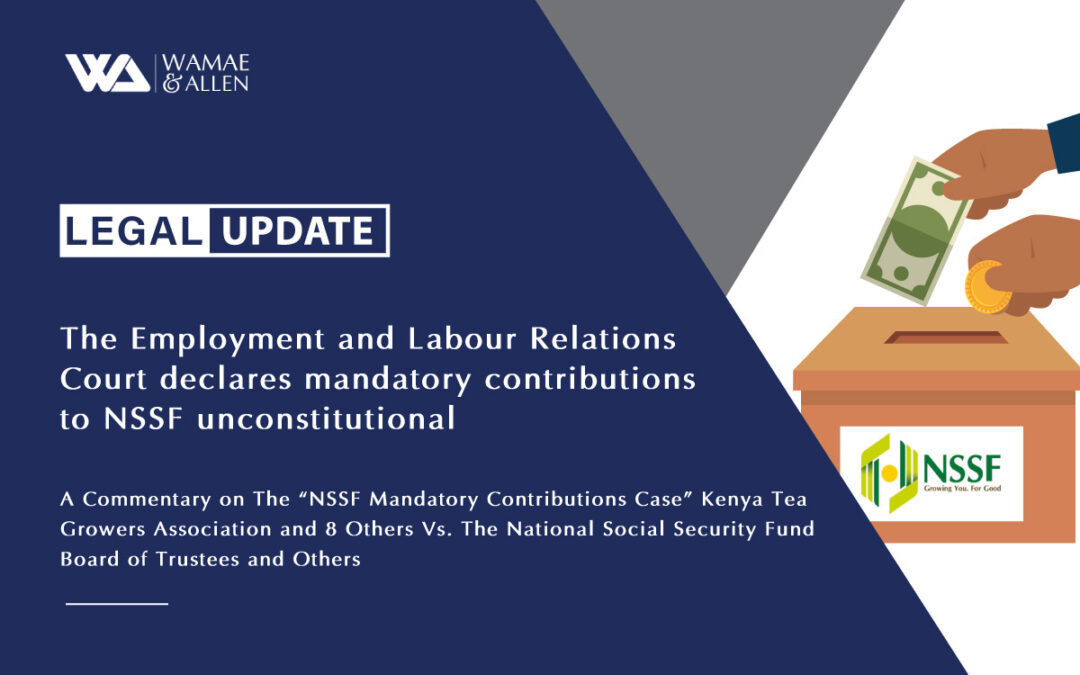Justices Nduma Nderi, Hellen Wasilwa and Monica Mbaru in Kenya Tea Growers Association and 8 Others v The National Social Security Fund Board of Trustees and Others, Petition No. 38 Of 2014 (Consolidated with Petition 34,35, 49 And 50 Of 2014)“156. For members who are already under existing contributory schemes, there is no constitutional justification to deny contributors their choice of pension scheme to subscribe to as the NSSF Act 2013 has done which is contrary to Article 49 of the constitution”
INTRODUCTION
What is social security? According to the International Labour Organisation’s (ILO) conventions particularly, the International Labour Standards on Social security, it is defined as a human right which responds to the universal need for protection against certain life risks and social needs.
The right to social security is of central importance in guaranteeing human dignity for all persons when they are faced with circumstances that deprive them of their capacity to fully realize their human rights. It encompasses the right to access and maintain benefits without discrimination in order to secure protection from: a lack of work-related income caused by sickness, disability, maternity, employment injury, unemployment, old age, or death of a family member; unaffordable health care; and insufficient family support, particularly for children and adult dependents. Social security plays an important role in reducing and alleviating poverty, preventing social exclusion and promoting social inclusion.
Of great importance is the right to social security, that the drafters of the 2010 Constitution made for progressive realisation of the right under Article 43 (1) (e) & Article 43(3), which reads;
‘43. Economic and social rights
(1) Every person has the right—
…
(e) to social security; and
(3) The State shall provide appropriate social security to persons who are unable to support themselves and their dependants.’
The NSSF Act 2013 sought to raise monthly contributions by employees from the current Kshs.200 monthly and demanded employers match the payout. In the quashed Act, total pension contribution for both the worker and employee was supposed to be a maximum of Sh4,136, being 12 percent of proposed maximum pensionable earnings of Sh34,476. The higher pension contributions were aimed at helping the NSSF build a bigger retirement pot and offer workers monthly stipends after retirement instead of the current one-off payment
The judgment is a blow to President William Ruto’s social security plan, which includes increasing the NSSF monthly contributions. The President has said the current rate is too low to build savings that would offer decent living upon retirement.
But the court decision has brought relief to employers who were expected to raise billions of shillings to match the workers’ contributions, a hit to firms that are yet to recover from the coronavirus-induced slump, which triggered job cuts, hiring freezes and business closures.
In the commentary, we shall discuss the reasons for the court’s findings and its implications n the social security in Kenya.
FACTS
The Petitioners sued the NSSF Board of Trustees, Cabinet Secretary for Labour, the Retirements Benefits Authority, the Competition Authority and the Attorney General, concerning various aspects of the National Social Security Fund Act, 2013 (the NSSF Act).
The gravamen of the petition was that the NSSF Act in its entirety was in violation of the constitution and therefore null and void. In the alternative, the petitioners sought a declaration that some sections of the Act were contrary to the constitution and the Competition Act.
The thrust of the petitioners’ argument was that in so far as the act obligates employers to register employees and trade union members who have adequate alternative pension or social security with the NSSF, it was a breach of articles 24, 26, 28, 27, 36, 41 and 43 of the Constitution. The petitioners also impugned the Act for obligating trade union members and other employees who have adequate alternative pension or social security schemes, to register with the NSSF. According to the petitioners’ members have always had longstanding and adequate gratuity, pension and security schemes which are far more advantageous to the employees than what NSSF has to offer. Therefore, compelling such employees or any employee to register with NSSF punitively overburdens the already strained payslips of employees.
The Petitioners also sought for the Act to be declared unconstitutional as it violated Articles 110 and 205 of the Constitution. Their arguments were that the Act was legislated without involving the Senate, yet it clearly affected the functions and powers of the county governments.
In a nutshell, the petitioners argued that the Act was oppressive, irrational and unreasonable and unjustifiable in a free, modern, open, transparent and democratic society.
The respondents, on the other hand argued that parliament was within its role when promulgating the Act to give effect to the right to social security under Article 43 of the Constitution. However, the Retirement Benefits Authority (RBA), conceded that there is no constitutional justification for denying employees and employers their choice of pension scheme, as the NSSF Act has done under Sections 18,19 and 20. The RBA also argued that the NSSF scheme fell way below the social security for all contemplated by Article 43 since NSSF is exclusive to the employed.
THE RATIO DECIDENDI
Concerning Section 19(2) of the NSSF Act, the court found that the section was unconstitutional to the extent of its preconditions registration with the NSSF as an entitlement to access public services. The court was of the view that the right to access public services can only be limited lawfully, reasonably and justifiably in compliance with Article 24 of the constitution, as was held in the case of Kenya Human Rights Commission v Communications Authority of Kenya and 4 Others [2018] eKLR.
According to the court, there was no legitimate purpose to be achieved by making registration with NSSF as a precondition for accessing public services. Therefore, the precondition was not reasonable and failed the proportionality test coined in Article 24 of the Constitution. Put differently, there were less restrictive means to encouraging employers to register with NSSF without making it a precondition for accessing public services.
Next, the court dealt with the petitioners’ argument that Section 17 of the NSSF Act which criminalizes any refusal or neglect to answer a question or to furnish information or documents when required to do so, without specifying its limits such as criminal intent or the wilful disobedience, contrary to Article 50. The court found that the appointed compliance officer under the section is bound by the rules of natural justice in execution of their mandate and is required to only sanction conduct that is found to be refusal and or neglect to furnish information by wilful delays or obstruction in the exercise of any power under the Act.
According to the Court, the Act was legislated without involving the Senate, yet it clearly affected the functions and powers of the county governments. In the Court’s view, the county governments finances, budgeting, and planning would be impacted upon as it imposes a mandatory and optional pension scheme for the county government and the county government would have contribution obligations on behalf of the public officers who worked in those county governments. Presently, County Governments submits themselves to a separate pension scheme through LAPTRUST or LAPFUND.
The Court also took the view that the duty to avail and allocate resources towards the enjoyment of the right to social security as well as to remove barriers towards the enjoyment of the right to social security as set out under Article 43(1)(e) of the Constitution rests with the state. Those resources ought to emanate from the state. To the extend the Act removed the duty from the state and vested it on the members, the Fund was an overreach on its statutory mandate.
The main prayers sought in the petition hinged on impugning the constitutional validity of Section 20 of the NSSF Act. Concerning the argument that the section violates the free choice of employers and employees to enlist with other pension schemes more advantageous and superior to NSSF. The court applied the case of Margaret Njeri Muiruri v Bank of Baroda (Kenya) Limited [2014] eKLR, where it was stated that despite the hallowed legal principle that parties are bound by contractual terms, courts must intervene in the face of unconscionable/or oppressive contracts. Accordingly, the court found that section 20 was an affront to freedom of choice.
The Court further directed its salvos at Section 13 of the Act which mandated the Cabinet Secretary to approve the remuneration payable to the Fund’s Board and its Committees, terming the provision as unconstitutional null and void. The Court faulted the provision for interfering with the mandate of the Salaries and Remuneration Commission on which the power to approve the said remuneration is vested.
Section 20 of the act was also impugned on grounds that it was discriminatory contrary to Article 27 of the Constitution, for only targeting employers and employees in terms of registration, contribution and membership, to the exclusion of the entire populace are required by Article 43 of the Constitution. On this ground, the court, in applying the discrimination test reiterated that differential treatment does not necessarily lead to discrimination. Therefore, since Section 26 of the Act obligates the labour CS to make regulations concerning voluntary registration of persons, the act did not preclude anyone from voluntarily registering and was therefore not discriminatory.
Lastly, the court held that since the Act favoured NSSF over other pension providers as social security, it would stifle and kill other pension schemes, to the detriment of consumers, contrary to the objects and purposes under Section 3 of the Competition Act.
In conclusion, the court declared the entire NSSF Act unconstitutional and null and void for violation of various articles of the Constitution and the Competition Act. The court further injuncted the respondents from demanding, compelling and or requiring mandatory registration, enrolment or enlisting of any employer or employee, whether registered as a member of any pension scheme or not.
IMPLICATIONS OF THE JUDGMENT AND CONCLUDING REFLECTIONS
Firstly, as a result of the judgment, no employer or employee should be compelled to register with or contribute to the NSSF, neither can anyone be denied public services for refusing or failing to enrol with NSSF. Furthermore, we note that the Act having been declared unconstitutional in its entirety, would mean that the statutory body known as NSSF would be illegal to as an entity. Therefore, a party cannot proceed to engage the with NSSF as there no existing provisions operationalise the relationship between the entity and its beneficiaries.
Secondly, the judgment could provide fodder for future litigation to declare mandatory contribution such as National Health Insurance Fund (NHIF) unconstitutional. It is important to note that the provisions of Sections 14A, 15 and 16 of the National Health Insurance Fund Act, 1998, compels the mandatory registration of employers and the mandatory deductions of the standard and matching contributions from the employee salaries. Such mandatory contributions and registration invariably deny employers and employees the freedom of choice to opt for other health insurance schemes valuable to NHIF.
Thirdly, the judgment is a blow to President William Ruto’s social security plan, which includes increasing the NSSF monthly contributions. The President has said the current rate is too low to build savings that would offer decent living upon retirement. The Judgment unless successfully appealed, shall impede the new government’s policy on building social security.
Lastly, such mandatory contributions have the effect of overburdening the already strained payslips of employees. We note that the judgment also did not address itself to the members contributions already accrued with the Fund, noting that the fund had an estimated total asset of Kshs. 250 Billion as at 2020. We note that the long-term effect of this judgment may have some benefits to employees, however, has similarly also created a conundrum to the Fund and the already significant contributions that have been made considering the court did not suspend the declaration of invalidity.
This article is provided free of charge for information purposes only; it does not constitute legal advice and should be relied on as such. No responsibility for the accuracy and/or correctness of the information and commentary as set in the article should be held without seeking specific legal advice on the subject matter. If you have any query regarding the same, please do not hesitate to contact Litigation vide litigation@wamaeallen.com
More Legal Updates
 Loading...
Loading...
About the author
Caxstone specializes in civil, employment and labour disputes, constitutional law, family law and succession, and environment and land matters. He has amassed a wealth of knowledge and experience in litigation which is evident in the successes obtained for clients. He is an active member of the Employment and Labour Relations Court Bar-Bench committee.
Kennedy has gained his experience in the arena of Dispute Resolution by acting for and advising both local and international clients in a myriad of disputes and preparation of various agreements. Over his years of practice, Kennedy has engaged in complex and high value litigation before the Court of Appeal, High Courts, as well as Quasi-Judicial Tribunals such as the Public Procurement Administrative Review Board, Tax Appeals Tribunal and international dispute resolution bodies.
Frankline M. Otieno is a dispute resolution associate, recommended professional and committed to offering sustainable client-centred solutions to legal issues.
Frankline is astute in commercial litigation, securities law, banking law, intellectual property litigation, public procurement, land law litigation, Judicial Review and Administrative law litigation, sports law, tax litigation, administrative law, consumer protection law, competition law and constitutional litigation.
-
Frankline Otienohttps://wamaeallen.com/author/frankline-michael-otieno/
-
Frankline Otienohttps://wamaeallen.com/author/frankline-michael-otieno/













